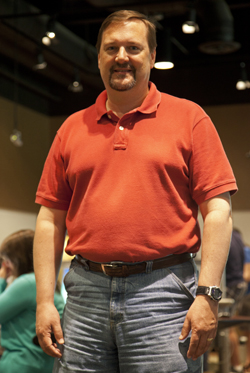 Lyle RupertWhen Lyle Rupert heard the Hendrix College Choir perform at his church, his college choice was complete.
Lyle RupertWhen Lyle Rupert heard the Hendrix College Choir perform at his church, his college choice was complete.
“I knew I wanted to do accounting and music … and I was blown away by choir,” said Rupert, a Kansas native, who finished high school in Fayetteville, Ark.
Hendrix allowed Rupert to use both sides of his brain – one side for the logic of finance/accounting and the other for the creativity of music. He was in the Hendrix Choir and the Hendrix Madrigals for four years and took organ lessons. While a student at Hendrix, he was the organist for First Presbyterian Church in Morrilton and, later, for First United Methodist Church in Conway.
Rupert graduated from Hendrix in 1982 and headed for the University Of Chicago Graduate School Of Business, where he completed his CPA and MBA. In graduate school, he was the organist and choir director for a Methodist church in Chicago.
When a new teaching position opened up at Hendrix, Rupert joined the faculty in 1987, alongside his mentors Eloise Raymond and Stephen Kerr
“It was my dream come true,” he said.
It was very intimidating to work alongside legends George Thompson and Bob Meriwether who he respected from his days as a student.
“But my fears were squelched immediately,” he said. “I distinctly felt welcome and valued from the get go.”
During his tenure, he has served as chair of the Economics and Business Department and chair of the Social Sciences Area. He is also in his fifth year as director of the Arkansas Governor’s School, which is held on the Hendrix campus during the summer. For the past 20 years, he has been the organist and choir director at First Presbyterian Church in Conway. This fall, Rupert will begin work on a Ph.D. in Leadership Studies at the University of Central Arkansas.
In his evolution from new kid on the block to senior faculty member, Rupert has seen Hendrix evolve as well. When Rupert came to Hendrix, 80 percent of the students were from Arkansas.
“It’s neat to see more students from the East and West coast students and international students,” he said of the College’s growth. “It adds greater diversity to the student body.”
The faculty has grown too.
“We have a more diverse faculty with more expertise,” he said. “And we can benefit students better by having larger faculty.”
One of the major developments during his early career was the change from the term system to the semester calendar.
“It was a huge change and an immense amount of work,” he said. “But it was refreshing. We rethought everything … the daily schedule, the yearly calendar, major requirements, and course content. And we learned a whole lot about ourselves.”
One of the biggest changes he has seen is the development of Your Hendrix Odyssey: Engaging in Active Learning.
“It has been huge, and it has served us very well,” he said. “We developed it how best we thought it fit, and it’s been a great academic addition to campus.”
Rupert has mentored dozens of Odyssey projects and taught a number of Odyssey-coded courses. He has also participated in two mission trips to Costa Rica through the Hendrix Miller Center for Vocation, Ethics, and Calling.
Odyssey gives structure to something that has long been a hallmark of the Hendrix experience – the opportunity for students to work closely with faculty in the classroom and through engaged learning projects that further their gifts, talents, and passions, Rupert said.
“Because it is out of the roots of Hendrix is one of the reasons it is so successful,” he said.
Rupert is working closely on what will be another important change for Hendrix –the development of a new School of Business.
“A lot of people think business doesn’t fit into liberal arts,” he said.
Rupert doesn’t agree.
Critical thinking, communication, and creative problem solving are all outcomes of a liberal arts education. Those skills are essential in business.
“You’re never going to succeed in business without them,” he said.
Rupert and other faculty will share the proposed plan with the Board of Trustees and faculty in the fall. The proposal calls for an advisory board of alumni business leaders, entrepreneurs, and others in the business community.
The proposed new school will both build upon the College’s business program and be a wholly new program.
“Number one, it will be rooted in the liberal arts … a Hendrix program built up from successful roots,” he said.
Eventually, the new school could include eight to 10 new faculty members with expertise in finance and marketing, he said.
The school would also offer more to non-business majors.
One new proposed component in the plan for a new business school is to award business certificates for non-majors. For example, it would allow art and music students the opportunity to get a business foundation so they would be better equipped to operate a studio, museum, or gallery.
“If it helps them practically, it helps their passion,” he said.
Rupert also sees tremendous potential for interdisciplinary collaboration with other new initiatives at the College, including environmental studies.
That example is a win-win situation for students and society, Rupert thinks.
Business students can learn about challenges in the environment, and environmentalists can learn how to succeed in the business world.
“It makes it a good program for Hendrix,” he said.
Last year, Rupert and other business faculty members held a roundtable discussion with alumni and local business leaders, all of whom were tremendously supportive of the concept.
The timing is right for the exploration of a School of Business, he said.
In 1998, Hendrix introduced a master’s in accounting program.
“A lot of people worried we were becoming a university,” said Rupert. “But they trusted us then and we held true to what we promised.”